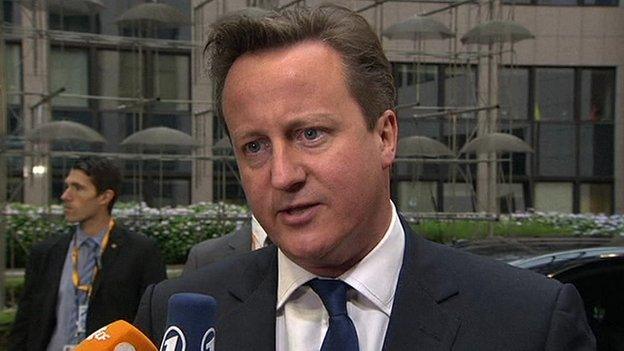New German party causes Cameron EU Parliament dilemma
- Published
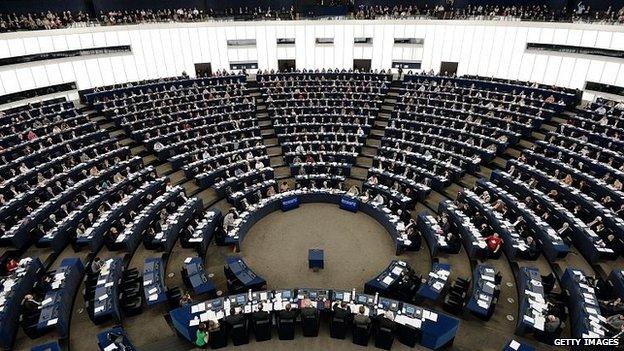
If you thought the cards were already stacked against David Cameron in renegotiating Britain's relationship with Brussels while also blocking Jean-Claude Juncker as the next European Commission President, well.... soon the prime minister could be dealt an even trickier hand.
The European Conservatives and Reformists Group (ECR) in the European Parliament meet on Wednesday - this is the group the Conservatives set up when they left the umbrella centre-right bloc the EPP, which was regarded by them as being too federalist and committed to ever closer union.
The new group has been very keen to acquire new members in order to boost funding and influence.
But its members now face a dilemma.
The seven MEPs elected from the Alternative fur Deutschland (AfD) party have knocked at the door and asked to join.
AfD is a German Eurosceptic party. Its cerebral leader, economics professor Bernd Lucke, insists it is not extreme. It was critical of the bailouts to struggling southern European countries and is anti-euro, rather than anti-Europe. It has floated splitting the euro in two - with a harder northern European currency and a rather softer southern one.
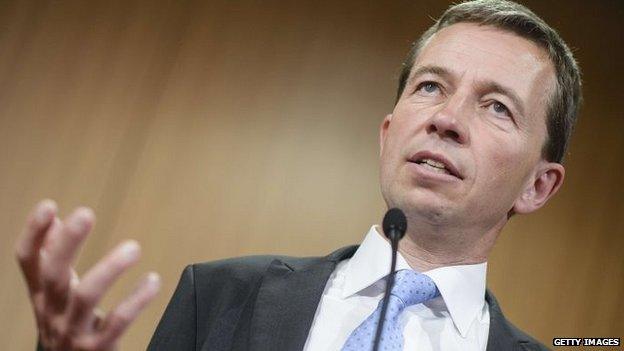
Bernd Lucke's party was founded last year and won 7% of the vote
So its leadership sees itself as rather more pro-EU than, say, UKIP, and do not want to join their group.
But Prime Minister David Cameron is far from keen to let them sit side-by-side with the Conservatives.
That is not because the AfD is unacceptably extreme - it is because the German Chancellor Angela Merkel finds them extremely annoying.
They compete directly with her CDU for the right of centre vote in Germany.
In order to give substance to any renegotiations, David Cameron will need treaty change. Angela Merkel can help deliver this, or indeed fail to deliver this, before his 2017 deadline for a referendum.
She could also scupper Jean-Claude Juncker's hopes of becoming the next EC president - though is perhaps less likely to do so as she would face a backlash in the German media.
Mr Juncker - regarded by No 10 as a 'federalist' not a reformer - was nominated by the EPP of which Merkel's CDU is an integral part.
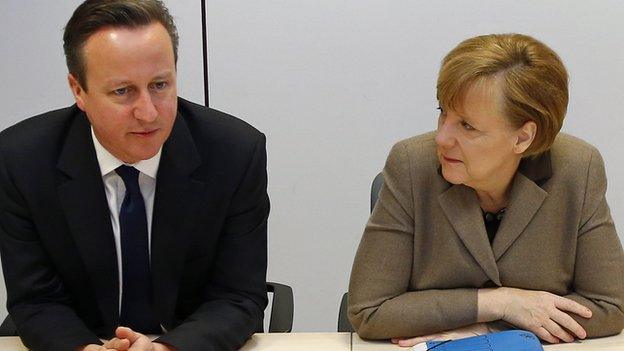
David Cameron does not want to unnecessarily annoy Angela Merkel
But more widely, to tackle benefit tourism, push through further deregulation, and complete the single market David Cameron knows Merkel's co-operation in EU reform will be vital. So he doesn't want to upset her unnecessarily.
But he has two problems.
First, the EPP incensed some Conservative MEPs by standing (unsuccessful) candidates against them at last month's European elections.
They say the German members of the EPP agreed to this.
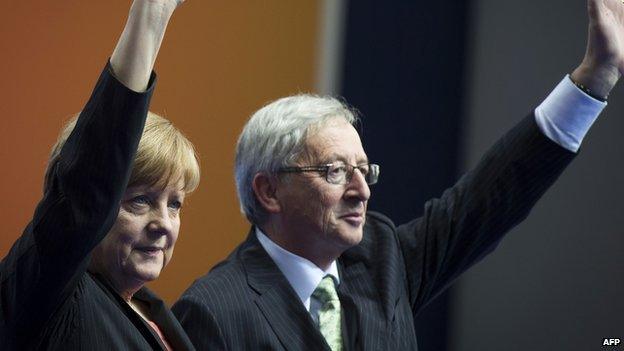
The Angela Merkel and Jean-Claude Juncker parties belong to the European People's Party bloc, which dominates the European parliament
As a result they have concluded that - unlike David Cameron - they no longer regard Merkel's CDU as their "sister party".
Already some MEPs - such as Dan Hannan and Nirj Deva - have indicated their support for AfD's membership application.
And they might just thumb their noses at Cameron and Merkel.
But there is another problem.
Before the euro elections, the Conservatives were the largest party in the ECR group.
Tail-tweaking?
But with fewer MEPs - down from 25 to 19 - they can be outvoted if, for example, their Polish and Czech allies decide to combine in favour of AfD membership. A simple majority would ensure their inclusion.
A fudge is the most likely temporary solution.
Existing members of the group might take a little while to decide whether AfD's policies and platform are in line with the ECR's constitution - otherwise known as the "Prague Declaration", which sets out the group's adherence to free markets and anti-federalism.
This could delay matters for a week - or more - but it's not impossible that David Cameron's post-EPP allies do not accept his friendly advice.
Then he will have to hope - as some of his MEPs believe - that Angela Merkel will accept this as minor tail-tweaking. Others are not so sure.
At a conference in Westminster on Tuesday Mats Persson of the influential Eurosceptic think tank Open Europe warned the Conservatives that embracing the AfD was not worth the risk to relations with other centre-right parties in the EPP.
But those Conservatives cannot control the process or the consequences.
- Published1 June 2014
